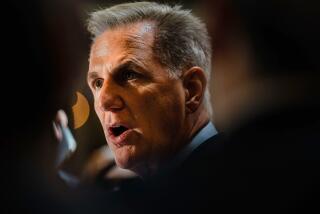EU leaders give Greece a Friday deadline for an acceptable bailout plan

Greek Finance Minister Euclid Tsakalotos arrives for a meeting of Eurozone finance ministers Tuesday.
- Share via
Reporting from Athens — Greece has until the end of this week to come up with an acceptable proposal for a new government bailout, failing which its neighbors will be prepared to let Athens go broke and flunk out of the euro currency group, European leaders said Tuesday.
The stark warning came after back-to-back meetings in Brussels of senior European officials, who offered a glimmer of hope that the debt-stricken Greek government might yet avoid a disastrous default but also expressed exasperation over its unpredictable negotiating strategy.
A credible Greek proposal of how it planned to cut costs and reform its economy in exchange for billions of dollars in emergency loans must be submitted no later than Friday morning, and leaders from all 28 nations of the European Union are to meet Sunday to decide if it is viable, officials said.
“We have only five days left to find the ultimate agreement,” European Union President Donald Tusk declared. “Until now, I have avoided talking about deadlines. But tonight I have to say loud and clear that the final deadline ends this week.”
Time is running desperately short for Greece, whose government and financial system are both close to running out of cash. Without a funding deal in the next few days, Greek banks will collapse and Athens will default on payments due, triggering an economic earthquake in a nation whose economy is already in deep depression.
With no more euros to draw on, the government would be forced to print its own much-less valuable currency. Financial chaos would ensue, as would, potentially, unrest in the streets.
At their back-to-back summits Tuesday, Eurozone finance ministers and leaders had expected Athens to present a detailed new bailout agreement.
The meetings were the first between Athens and its European partners since talks broke down late last month over a surprise referendum called by Greek Prime Minister Alexis Tsipras on the European bailout proposals then on the table. Relations between the two sides reached a low point.
But some participants at the summits were shocked when Greek officials, including the newly installed finance minister, Euclid Tsakalotos, put down no formal written offer at either meeting. Instead, officials held only oral discussions, which, though described by some as productive and useful, fell far short of the progress that European leaders had hoped to make toward a new solution to Greece’s long-running debt crisis.
The leaders then issued their ultimatum: Athens is now expected to submit its written proposals within the next few days.
Tsipras, looking upbeat, said the proposals would contain “credible reforms that are socially just” and described Tuesday’s discussions as taking place “in a positive climate.”
Broadly, Tsipras’ government is expected to agree to substantially the same package that was on the table before negotiations collapsed and that was voted on — and soundly rejected — by Greeks in Sunday’s referendum. Although it includes what a Greek official called “certain improvements,” the plan entails painful austerity cuts on top of the substantial reductions in public spending that Athens has implemented during the last five years.
How Tsipras, a magnetic left-wing leader who came to power in January pledging to end austerity, plans to sell this to his backbenchers and the Greek public is unclear. Since becoming prime minister, he has confounded observers with a governing style that critics describe as reckless and erratic.
Jeroen Dijsselbloem, the chief of the Eurozone’s finance ministers, said a formal Greek bailout request needed to come in quickly so that it could be properly scrutinized and then, if it passed muster, deliberated on by European leaders.
“We will see if we can formally start the negotiations. All this has to be done in a matter of days,” Dijsselbloem said.
German Chancellor Angela Merkel said that, during the discussions in Brussels, Athens had still not shown itself ready to commit to the reforms and cuts that the Eurozone says are necessary for it to be granted a bailout package.
But Italian Prime Minister Matteo Renzi sounded a more optimistic note, saying he hoped for a “happy ending” to the Greek crisis at the emergency EU summit called for Sunday.
The comments by Merkel and Renzi were another indication of the rift that has opened up between Eurozone nations on reaching an agreement with Greece, which could further complicate the process.
Several Northern European countries, such as Germany and Austria, have vented their frustration with Greece and have expressed a desire to cut it loose if it continues to flout the rules, whereas some Southern European countries, including France and Italy, have appeared more willing to be flexible in finding a solution.
French Prime Minister Manuel Valls said his country would do its utmost to keep Greece within the Eurozone, describing an exit as a “risk for global economic growth” and a serious blow to European unity.
“The Eurozone must stay coherent, reliable,” Valls said in a radio interview. “Europe is not just a currency. It is a conception of the world.”
Tusk, the EU president, described the next few days as “maybe the most critical moment in our history.”
But Jean-Claude Juncker, the head of the European Commission, said it was now up to Athens whether it stayed in the Eurozone. He also revealed that European officials have already drawn up “in detail” a plan to deal with a Greek exit from the euro, or “Grexit.”
“I’m strongly against Grexit, but I can’t prevent it if the Greek government is not doing what we expect the Greek government to do,” Juncker said. Another contingency plan called for “humanitarian aid” to Greece in the event of a Greek bank failure and government default, he said, which would wreak havoc on residents’ lives.
Analysts say the possibility of default by Greece and the country’s subsequent exit from the Eurozone, the club of 19 nations that use the euro currency, is now higher than ever. Such an event would have an immediate disastrous effect on the Greek economy, which has shrunk by 25% since 2009.
The Greek government needs new rescue loans to pay public-sector salaries and pensions and to service its monumental debt later this month. If it fails to make a debt payment to the European Central Bank on July 20, Greece would almost certainly be declared in default and be forced to start issuing IOUs, and potentially a new currency.
Greek banks have been closed since June 29, and residents have been restricted to daily ATM withdrawals of about $66. Although the banks are supposed to reopen Thursday, most analysts doubt that it will happen.
Follow @HenryHChu on Twitter for news on the Greece debt talks
More to Read
Sign up for Essential California
The most important California stories and recommendations in your inbox every morning.
You may occasionally receive promotional content from the Los Angeles Times.











